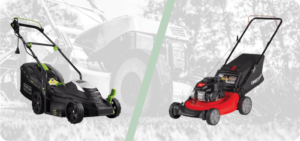
Electric vs gas yard equipment presents homeowners with a choice that can significantly influence their gardening and maintenance experience. As we delve into this topic, we’ll explore the striking differences in power, efficiency, and environmental impact, offering you a well-rounded perspective. Whether you’re mowing, trimming, or blowing leaves, understanding these distinctions can lead to smarter equipment choices for your yard tasks.
With the rise of electric tools and the enduring reliability of gas-powered ones, it’s crucial to consider various factors such as maintenance requirements and specific applications. This exploration will guide you through the options available in the market, helping you make informed decisions that suit your needs and preferences.
Comparison of Electric and Gas Yard Equipment

When it comes to yard maintenance, choosing between electric and gas-powered equipment can significantly influence both performance and environmental impact. Each type of equipment has its own strengths and weaknesses, making it essential for homeowners and landscapers to weigh their options based on power needs, efficiency, maintenance, and ecological considerations.Electric yard equipment generally operates quieter and produces zero emissions during use, while gas equipment tends to offer more power but at the cost of fuel consumption and air pollution.
Comparing these types of equipment reveals crucial differences that can affect both yard care effectiveness and environmental health.
Power and Efficiency Differences
Power and efficiency are critical factors to consider when selecting yard equipment. Gas-powered tools often deliver more torque, providing the strength needed for tougher jobs like heavy-duty mowing or brush clearing. In contrast, electric models are typically sufficient for lighter tasks such as trimming or small-scale mowing. Electric tools are generally rated in volts, with most standard equipment operating at 120V or 240V.
For instance, a 20V battery-operated lawn mower can handle a small lawn efficiently. On the other hand, gas engines are rated in cubic centimeters (cc) or horsepower (HP), allowing for higher power outputs. A typical gas-powered mower can range from 150cc to 250cc, offering robust performance for larger areas.Despite their power, gas equipment can be less efficient due to fuel consumption and the energy needed for maintenance.
Electric models are often more energy-efficient, converting nearly all their energy into usable power without the byproducts of combustion.
Environmental Impact
The environmental implications of using electric versus gas yard equipment are substantial. Electric tools emit no direct emissions, contributing to cleaner air quality and reduced greenhouse gases. Their reliance on electrical grids can still depend on the energy sources used, but advancements in renewable energy make them increasingly sustainable.In comparison, gas-powered equipment releases pollutants such as carbon monoxide and nitrogen oxides, which can negatively impact air quality and contribute to climate change.
A study conducted by the California Air Resources Board found that using a gas lawn mower for one hour produces as much smog-forming pollution as driving a modern car for over 1,200 miles. Switching to electric equipment can also lead to reduced noise pollution, which is particularly beneficial in residential areas where noise restrictions might apply.
Maintenance Requirements
Maintenance is an essential aspect of equipment longevity and performance. Gas-powered tools often require more extensive upkeep compared to their electric counterparts. Maintenance tasks for gas equipment typically include:
- Regular oil changes to keep the engine lubricated and running smoothly.
- Spark plug replacement to ensure proper ignition and performance.
- Fuel system cleaning to prevent clogging and ensure efficient fuel delivery.
- Air filter replacement to maintain airflow and engine performance.
- Regular inspections for leaks, wear, and tear, especially in the fuel system.
In contrast, electric equipment generally has fewer maintenance needs. Key maintenance aspects include:
- Battery care, including regular charging and storage in a cool, dry place.
- Occasional cleaning of blades and parts to maintain efficiency.
- Inspection of electrical connections for wear or damage.
Overall, electric tools offer a more straightforward maintenance regimen, making them appealing for users who prefer convenience and lower upkeep costs.
Types of Yard Equipment
When it comes to maintaining your yard, choosing the right equipment can make all the difference. With advancements in technology, both electric and gas yard equipment have become widely available, each offering unique benefits suited to different tasks. Understanding the types of equipment available and their specific applications is crucial for achieving optimal results in your outdoor space.Electric yard equipment is gaining popularity due to its eco-friendliness, quieter operation, and lower maintenance requirements.
These tools are designed for a variety of yard tasks, making them versatile options for homeowners seeking efficiency and ease of use. Here are some of the most common types of electric yard equipment and their benefits:
Electric Yard Equipment
Electric yard equipment includes an array of tools that cater to various landscaping and maintenance needs. Some popular options are:
- Electric Lawn Mowers: Ideal for small to medium-sized lawns, these mowers are lightweight and easy to maneuver. They produce zero emissions and operate quietly, making them suitable for residential areas.
- Electric String Trimmers: Perfect for edging and trimming around flower beds and fences, electric string trimmers are easy to handle and require minimal maintenance.
- Electric Leaf Blowers: These tools are effective for clearing leaves and debris from patios, driveways, and gardens. They are quieter than gas models and don’t require fuel mixing.
- Electric Hedge Trimmers: Available in various sizes, electric hedge trimmers help maintain the shape and appearance of hedges and shrubs without the hassle of gas refueling.
The benefits of electric yard equipment include reduced environmental impact, lower operating costs, and the convenience of being lightweight and easy to store. For homeowners looking for a sustainable option, electric tools are an excellent choice.On the other hand, gas-powered yard equipment remains a steadfast choice for those who require high-performance tools for larger properties or more demanding tasks. Here are some popular types of gas yard equipment and their applications:
Gas Yard Equipment
Gas-powered tools are known for their strength and efficiency, making them suitable for heavy-duty yard work. Here are a few common types:
- Gas Lawnmowers: These mowers provide the power needed for larger lawns, tackling thicker grass and uneven terrains with ease.
- Gas Chainsaws: Essential for tree trimming and cutting, gas chainsaws are powerful and can handle larger branches and logs, making them a must-have for serious gardeners.
- Gas Leaf Blowers: More powerful than electric models, gas leaf blowers are ideal for clearing large areas quickly and effectively, especially in commercial settings.
- Gas Trimmers and Brush Cutters: These tools are excellent for heavy overgrowth and thick vegetation, making them perfect for rural properties or extensive gardens.
Gas yard equipment is particularly advantageous for homeowners with larger yards or tough landscaping needs. Their durability and power make them invaluable for significant outdoor tasks.Choosing the right yard equipment depends largely on the specific tasks you need to perform. Understanding the requirements of lawn mowing, trimming, and blowing will help you make informed decisions. Here are a few considerations:
Choosing the Right Equipment for Yard Tasks
When selecting yard equipment, consider the following factors:
- Size of the Area: Larger properties may benefit from gas-powered tools for their enhanced performance, while smaller yards can be efficiently managed with electric tools.
- Type of Vegetation: If the yard contains thick grass or heavy brush, gas-powered equipment may be necessary to handle these challenges effectively.
- Frequency of Use: For frequent maintenance, electric tools may be more convenient and cost-effective due to lower energy costs and maintenance.
- Environmental Impact: Consider electric options for their reduced emissions, especially if you’re conscious about environmental sustainability.
By assessing these factors, you can choose the equipment that best fits your yard maintenance needs, ensuring a well-kept and beautiful outdoor space.
Related Home Improvement Considerations

Selecting the right tools and equipment for home improvement tasks is crucial for ensuring efficiency, safety, and quality results. When it comes to maintaining a stone brick storage garage, the choice of yard equipment plays a significant role in preserving the integrity and aesthetic of the structure. Additionally, the upkeep of swimming pools and spas can greatly benefit from the appropriate yard equipment, enhancing overall maintenance routines.
Importance of Selecting the Right Tools for a Stone Brick Storage Garage
Using the suitable tools and equipment helps to protect the stone brick surfaces from damage while ensuring effective maintenance. For example, pressure washers can efficiently remove dirt and debris, but using the right pressure setting is essential to avoid harming the bricks. Similarly, maintaining the surrounding landscape with the correct yard equipment can prevent overgrowth and root damage to the foundation of the storage garage.
The right tools not only enhance the visual appeal but also extend the lifespan of the garage, ultimately safeguarding your investment.
Impact of Yard Equipment on Swimming Pool and Spa Maintenance
Proper yard equipment is vital for maintaining clean and safe swimming pools and spas. The right tools can aid in regular cleaning, chemical balancing, and overall upkeep. For instance, robotic pool cleaners can simplify the cleaning process by effectively removing debris from the pool bottom, while leaf blowers are handy for clearing the surrounding areas. Aspects like landscaping can also influence pool maintenance, as overgrown plants may introduce debris and insects into the water, necessitating more frequent upkeep.
Essential Tools for Home Windows Maintenance Complementing Yard Equipment
A well-maintained home requires attention to various aspects, including windows. The right maintenance tools not only ensure the longevity of windows but also complement yard equipment. Regular window maintenance is essential for energy efficiency and aesthetic appeal. Below are some essential tools that are beneficial to incorporate alongside yard equipment for optimal home maintenance:
- Window Scraper: A tool for removing stubborn dirt, paint, or debris from glass surfaces.
- Bucket and Squeegee: Essential for washing windows effectively, allowing for streak-free results.
- Lint-Free Cloths: Used to wipe down windows after cleaning to achieve a spotless finish.
- Caulking Gun: Necessary for sealing gaps around windows, which helps improve energy efficiency.
- Extension Poles: Useful for accessing high windows without the need for ladders, enhancing safety during maintenance.
Outcome Summary
In summary, the choice between electric and gas yard equipment is more than a matter of preference; it impacts efficiency, environmental responsibility, and maintenance routines. As we’ve discussed, each type has its unique benefits and potential drawbacks. Making the right choice can enhance your yard work experience, ensuring that it’s both effective and enjoyable.
Key Questions Answered
What are the main advantages of electric yard equipment?
Electric yard equipment tends to be quieter, more environmentally friendly, and often requires less maintenance compared to gas-powered tools.
Is gas equipment more powerful than electric?
Generally, gas equipment offers more power and is better suited for larger tasks or heavy-duty jobs, while electric equipment excels in smaller, residential settings.
How does the cost of electric vs gas equipment compare?
Electric equipment typically has a lower upfront cost and can save money on fuel, while gas equipment may have higher initial costs but could be more durable for extensive use.
Which type of equipment is safer to use?
Electric equipment is generally safer as it eliminates the risk of fuel spills and exhaust emissions, making it more suitable for residential areas.
How do I maintain electric yard equipment?
Maintenance usually involves keeping the battery charged, cleaning the blades, and checking for any wear on electrical components, which is typically simpler than gas maintenance.





